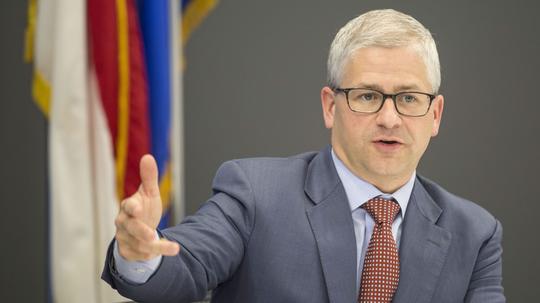
The swift fall of bankrupt cryptocurrency company FTX has only made U.S. Rep. Patrick McHenry's call for a solid crypto regulatory framework more paramount.
McHenry – a Republican from North Carolina's 10th Congressional District, which includes portions of the Charlotte region – was selected as chairman of the House Financial Services Committee in December. He's served on the board since he was first elected to Congress in 2005. After assuming the role as chairman, McHenry hasn't wasted time in working to establish stricter crypto laws.
McHenry announced Jan. 12 the formation of a new subcommittee focused on digital assets, financial technology and inclusion. He told the Charlotte Business Journal the move was necessary given there formerly wasn't a focus on the more than $1 trillion crypto industry.
"I restructured it because there have been hundreds of billions of dollars of consumer money lost in digital assets," he said. "And so I thought it deserved its own special focus, given the amount of economic harm that has resulted by regulatory inaction and legal inaction."
The new subcommittee will provide "clear rules of the road" among federal regulators for the digital asset industry, according to a news release from the Financial Services Committee. It will also identify the best policies to continue strengthening diversity and inclusion in the industry. The subcommittee will be chaired by Rep. French Hill, R-Ark., who was also appointed as the full committee's vice chairman.
The subcommittee's establishment comes as several pieces of crypto legislation are working their way through Congress, including most recently the Stablecoin TRUST Act. That would establish a federal regulatory framework for stablecoins. U.S. Sen. Pat Toomey, R-Pa., introduced the legislation last year in his last acts of office, following his plans to retire.
McHenry said he sees crypto as a technology with economic potential. He envisions the digital asset as an opportunity for the U.S. to be at the forefront of internet technology for at least another three decades.
"If we can get legal clarity, then we can have legitimate investment dollars come into this technology field," he said. "I want clear rules of the road so we don't have fraudsters like Sam Bankman-Fried (FTX founder) leading this technology."
The fall of FTX was evidence that fraudsters and scammers are "playing" in the cryptocurrency space due to the absence of solid legislation for the asset, McHenry said.
FTX shifted last November from a respected company in the crypto industry to one in bankruptcy crisis with more than $8 billion of its customers' funds lost. That same month, the Financial Services Committee rallied its call to bank regulators for the need to schedule a hearing to investigate the FTX crash.
McHenry's committee anticipates holding hearings in February, as well as presenting legislation in the summer, according to CBS News.
"The regulators have existing powers that they do not use to protect consumers," McHenry said. "So we're going to see why the regulator's acted like they did and get to the bottom of that."
McHenry said his investigations into FTX paint a clear picture that the company chose the Bahamas as its headquarters because of the country's low crypto regulation.
"If we had even the basics of how they must hold their assets — how they have to custody their customers' crypto. If we had just that basic protection, much of what they did would not be possible," he said. "Because we don't have law around the exchange of digital assets, we've left consumers much more victim to companies like FTX."
McHenry said his committee is still at the beginning of its mission to establish a bipartisan crypto bill, however, it's making steady progress. Legislation would initially include a distinct definition of cryptocurrency and clear rules on how to buy and sell the digital asset.
"I think we have a real opportunity to write law of this Congress," he added.